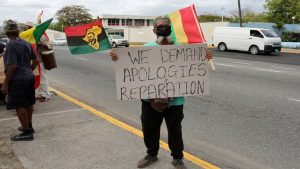As coronavirus cases across Africa continue to surge, some parts of the continent are now experiencing a second wave of the virus.
According to a Reuters tally, countries such as the Democratic Republic of Congo, Nigeria, Mauritania, Ghana and Ivory Coast have seen a spike in cases while reporting near-record levels of infection.
South Africa is the worst affected country by the COVID-19 second wave in the continent.
According to the World Health Organisation Africa Regional Office (WHO Africa), COVID-19 cases have seen a steady rise since mid-October, averaging at 46 000 cases per week, compared to about 29 000 between early September and early October.
The continent currently sits at over 2.5 million cases, with over 2.1 million recoveries and over 60 000 deaths.
The WHO Africa says this underscores the need for “reinforced public health measures to avert a surge in infections,” and stronger action to help the continent recover from the coronavirus pandemic.
Some reasons behind the surge
- As cases in some countries started to see a decline, governments started to ease some lockdown restrictions, allowing for more economic activity and travel between regions and provinces.
- According to the Africa Centres for Disease Control (Africa CDC) and WHO Africa, one of the biggest drivers behind surging cases in countries across the continent are increased movements and interactions.
- Non-adherence to health protocols such as social distancing and the wearing of masks during these movements and interactions also play a huge role in spreading the virus.
- Other factors include low testing across some regions; as testing remains critical towards tracking and understanding the pandemic trend.
Countries most affected by second wave and interventions to curb the spread
South Africa
Earlier this month, South Africa’s Health Minister Dr Zweli Mkhize announced that the country was dealing with a second COVID-19 wave, as determined by scientific models.
In his address on the 9th of December, Dr Mkhize said the average number of daily infections since the end of September had gone down to an average of 1 000.
Up to date, these cases have since steadily increased to a daily average of over 9 000 cases.
The graphic below gives a comprehensive view of the current cases in South Africa:

Loading…
Further exacerbating the country’s second wave woes is a new variant of COVID-19 that’s spreading rapidly and dominating new infections in South Africa.
In the video below, Epidemiologist and Chairperson of the Ministerial Advisory Committee on COVID-19 Professor Salim Abdool Karim says scientists are now involved with the tough task of trying to track how the virus has changed to foster a new variant:
In a bid to curb the spread of the virus, President Cyril Ramaphosa announced some amendments to the current Level 1 Lockdown regulations, which include:
- A revised curfew starting at 11pm – 4am (not applicable to essential workers)
- Alcohol at retail outlets sold Monday to Thursday from 10am – 6pm
- No on-site alcohol consumption at licensed establishments after 10pm
- No consumption of alcohol in public spaces, including beaches and parks
- Curfew at beaches and closure of beaches in areas declared hotspot
Nigeria
Africa’s most populous nation, Nigeria, currently has over 79 000 confirmed cases, with over 68 000 recoveries and over 1 200 deaths.
Just a day after South Africa announced its second wave, Nigeria’s Health Minister Dr. Osagie Ehanire warned that the country may be on the verge of a second wave with cases rising sharply over the past few weeks.
As seen in a Reuters report, Nigeria’s capital Lagos, its commercial capital Abuja and the northern state Kaduna emerged as new epicentres, making up over 70% of confirmed cases.
Positive tests have increased since the second week of December, with the spread being attributed to large gatherings and not adhering to health regulations.
The following interventions to curb infections have since been put forward:
- Limiting public gatherings, closing bars and night bars for the next five weeks
- Government considering limiting international travel where a new COVID-19 variant has been identified
- And in Lagos, an indefinite shutting down of schools, banning of concerts, carnivals and street parties, and ordering civil servants to work from home
Kenya
Kenya currently sits at over 95 000 confirmed cases, with over 76 000 recoveries and over 1600 deaths.
Despite rising infections, Kenya’s public health sector is under immense strain due to a nationwide strike by nurses and clinical workers.
They are demanding better working conditions, medical and insurance cover and adequate personal protective equipment amid the coronavirus pandemic.
Doctors have since joined the strike which has now been running for the third week.
Kenya was worst hit in October following a spike in cases, with the number of infections rising by 15 000 during the month alone.
As cases increased, President Uhuru Kenyatta extended the country’s midnight curfew to the 3rd of January 2021 as part of measures to limit the spread of the virus.
Democratic Republic of Congo
The Democratic Republic of Congo (DRC) currently sits at over 15 800 confirmed cases, with over 13 700 recoveries and over 370 deaths since the pandemic hit the country.
President Felix Tshisekedi attributed the second wave of COVID-19 in the country to cases from foreign countries after the re-opening of airspace in August; and the relaxation of lockdown and prevention measures.
As seen in a Reuters report earlier this month, head of the DRC’s COVID-19 response team Jean-Jacques Muyembe cautioned of a shortage of oxygen, adding that the second wave sees more patients being admitted in hospitals as compared to the first.
Last week, DRC imposed the following measures to mitigate the effects of the second wave:
- A curfew of 9pm to 5am
- Banning of marches and meetings of more than 10 people
- School holidays beginning early, and the indefinite suspension of higher education and university courses
- Continuation of sports competitions without fans
Congo’s mining industry will however not be affected by the new rules.
Responding to the second wave
As the pandemic continues to spread across the continent, the Africa CDC says countries need to re-evaluate, re-strategize, and re-invigorate their COVID-19 response activities” in a bid to handle a second wave and a potential third wave.
In the report below, the Africa CDC provides comprehensive guidelines on how African states can adequately respond to the COVID-19 second wave:






